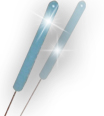| ||||||||||||||||
|
| ||||||||||||||||||||||||||||||||||||
| |||||||
Behavioral treatments
Many physicians believe that exercise for 15–20 minutes per day is helpful for reducing the frequency of migraines.
Sleep is often a good solution if a migraine is not so severe as to prevent it, as when a person awakes the symptoms will have most likely subsided.
Diet, visualization, and self-hypnosis are also alternative treatments and prevention approaches.
Sexual activity has been reported by a proportion of male and female migraine sufferers to relieve migraine pain significantly in some cases.
In many cases where a migraine follows a particular cycle, attempting to interrupt the cycle may prolong the symptoms. Letting a headache "run its
course" by not using painkillers can sometimes decrease the length of an episode. This is especially true of cases where vomiting is common, as
often the headache will subside immediately after vomiting. Curbing the pain may delay vomiting, and prolong the headache.[citation needed]
Alternative medicine
A number of forms of alternative medicine, particularly bodywork, are claimed to help prevent migraines.
Some preliminary clinical trials have suggested that chiropractic care may be an efficacious treatment for migraine headaches[54][55] These initial
studies are limited by lack of control subjects, poor control subjects, lack of blind study design, small sample sizes, and other methodological flaws.
[56] A review of the literature until 2004 found that "Chiropractic manipulation demonstrated a trend toward benefit in the treatment of TTH, but
evidence is weak. ... In the absence of clear evidence regarding their role in treatment, physicians and patients are advised to make cautious and
individualized judgments about the utility of physical treatments for headache management; in most cases, the use of these modalities should
complement rather than supplant better-validated forms of therapy.
Testimonials
Click here to schedule an appointment in Manhattan or Queens NY or/and send alternative medicine and healing without medications acupuncture
specialist your health question or call "Feel Good Acupuncture" at 646-327-7267.
Many physicians believe that exercise for 15–20 minutes per day is helpful for reducing the frequency of migraines.
Sleep is often a good solution if a migraine is not so severe as to prevent it, as when a person awakes the symptoms will have most likely subsided.
Diet, visualization, and self-hypnosis are also alternative treatments and prevention approaches.
Sexual activity has been reported by a proportion of male and female migraine sufferers to relieve migraine pain significantly in some cases.
In many cases where a migraine follows a particular cycle, attempting to interrupt the cycle may prolong the symptoms. Letting a headache "run its
course" by not using painkillers can sometimes decrease the length of an episode. This is especially true of cases where vomiting is common, as
often the headache will subside immediately after vomiting. Curbing the pain may delay vomiting, and prolong the headache.[citation needed]
Alternative medicine
A number of forms of alternative medicine, particularly bodywork, are claimed to help prevent migraines.
Some preliminary clinical trials have suggested that chiropractic care may be an efficacious treatment for migraine headaches[54][55] These initial
studies are limited by lack of control subjects, poor control subjects, lack of blind study design, small sample sizes, and other methodological flaws.
[56] A review of the literature until 2004 found that "Chiropractic manipulation demonstrated a trend toward benefit in the treatment of TTH, but
evidence is weak. ... In the absence of clear evidence regarding their role in treatment, physicians and patients are advised to make cautious and
individualized judgments about the utility of physical treatments for headache management; in most cases, the use of these modalities should
complement rather than supplant better-validated forms of therapy.
Testimonials
Click here to schedule an appointment in Manhattan or Queens NY or/and send alternative medicine and healing without medications acupuncture
specialist your health question or call "Feel Good Acupuncture" at 646-327-7267.
Celiac disease and gluten sensitivity may be an underlying cause of migraines in some patients, and a gluten-free diet has been demonstrated to
reduce, if not completely eliminate, migraines in these individuals. A study of 10 patients with a long history of chronic headaches that had recently
worsened or were resistant to treatment found that all 10 patients were sensitive to gluten. MRI scans determined that each had inflammation in their
central nervous systems caused by gluten-sensitivity. Seven out of nine of these patients that went on a gluten-free diet stopped having headaches
completely. Another study showed that migraneurs were 10 times more likely than the general population to have celiac disease, and that for
migraneurs with celiac disease, a gluten-free diet improved blood-flow to the brain and either eliminated migraines or reduced migraine frequency,
duration, and intensity.
Herbal and nutritional supplements
Butterbur
50 mg or 75 mg/day of butterbur (Petasites hybridus) rhizome extract was shown in a controlled trial to provide 50% or more reduction in the number of
migraines to 68% of participants in the 75 mg dose group, 56% in the 50 mg dose group and 49% in the placebo group after four months. Native
butterbur contains some carcinogenic compounds, but a purified version, Petadolex, does not.
Cannabis
Cannabis was a standard treatment for migraines from 1874 to 1942.[22] It has been reported to help people through an attack by relieving the nausea
and dulling the head pain, as well as possibly preventing the headache completely when used as soon as possible after the onset of pre-migraine
symptoms, such as aura.
Coenzyme Q10
Supplementation of coenzyme Q10 has been found to have a beneficial effect on the condition of some sufferers of migraines. In an open-label trial,
Young and Silberstein found that 61.3% of patients treated with 100 mg/day had a greater than 50% reduction in number of days with migraine, making
it more effective than most prescription prophylactics. Fewer than 1% reported any side effects. A double-blind placebo-controlled trial has also found
positive results.
Feverfew
The plant feverfew (Tanacetum parthenium) is a traditional herbal remedy believed to reduce the frequency of migraine attacks. A number of clinical
trials have been carried out to test this claim, but a 2004 review article concluded that the results have been contradictory and inconclusive.[25]
However, since then, more studies have been carried out.[26] As well as its prophylactic properties, feverfew is also touted as a migraine abortive.
Magnesium citrate
Magnesium citrate has reduced the frequency of migraine in an experiment in which the magnesium citrate group received 600 mg per day oral of
trimagnesium dicitrate. In weeks 9–12, the frequency of attacks was reduced by 41.6% in the magnesium citrate group and by 15.8% in the placebo
group.
Omega-3 fatty acids
Omega 3 fatty acids have been studied as a method of controlling frequency and intensity of migraines, with a Danish study showing 2/3 of participants
who took Omega 3 supplements seeing a decline in intensity and duration of migraines of roughly 30%.[28] However, another study found Omega 3
treatment to be non-effective
Riboflavin
The supplement Riboflavin (also called Vitamin B2) has been shown (in a placebo-controlled trial) to reduce the number of migraines, when taken at the
high dose of 400 mg daily for three months.
Vitamin B12
There is tentative evidence that vitamin B12 may be effective in preventing migraines. In particular, in an open-label pilot study, 1 mg of intranasal
hydroxocobalamin (a form of Vitamin B12), taken daily for three months, was shown to reduce migraine frequency by 50% or more in 10 of 19
participants. Although the study was not placebo-controlled, this response is larger than the typical placebo effect in migraine prophylaxis.
Melatonin
Melatonin has been studied in migraine and other headache disorders. In an open label study, migraine patients taking melatonin 3 mg before bedtime
with a good headache response and tolerability. Melatonin has multiple mechanisms affecting migraine pathophysiology.
Do not take chances. You can use our experience with protocols combining the dosage and use of herbal supplements for the best results.
reduce, if not completely eliminate, migraines in these individuals. A study of 10 patients with a long history of chronic headaches that had recently
worsened or were resistant to treatment found that all 10 patients were sensitive to gluten. MRI scans determined that each had inflammation in their
central nervous systems caused by gluten-sensitivity. Seven out of nine of these patients that went on a gluten-free diet stopped having headaches
completely. Another study showed that migraneurs were 10 times more likely than the general population to have celiac disease, and that for
migraneurs with celiac disease, a gluten-free diet improved blood-flow to the brain and either eliminated migraines or reduced migraine frequency,
duration, and intensity.
Herbal and nutritional supplements
Butterbur
50 mg or 75 mg/day of butterbur (Petasites hybridus) rhizome extract was shown in a controlled trial to provide 50% or more reduction in the number of
migraines to 68% of participants in the 75 mg dose group, 56% in the 50 mg dose group and 49% in the placebo group after four months. Native
butterbur contains some carcinogenic compounds, but a purified version, Petadolex, does not.
Cannabis
Cannabis was a standard treatment for migraines from 1874 to 1942.[22] It has been reported to help people through an attack by relieving the nausea
and dulling the head pain, as well as possibly preventing the headache completely when used as soon as possible after the onset of pre-migraine
symptoms, such as aura.
Coenzyme Q10
Supplementation of coenzyme Q10 has been found to have a beneficial effect on the condition of some sufferers of migraines. In an open-label trial,
Young and Silberstein found that 61.3% of patients treated with 100 mg/day had a greater than 50% reduction in number of days with migraine, making
it more effective than most prescription prophylactics. Fewer than 1% reported any side effects. A double-blind placebo-controlled trial has also found
positive results.
Feverfew
The plant feverfew (Tanacetum parthenium) is a traditional herbal remedy believed to reduce the frequency of migraine attacks. A number of clinical
trials have been carried out to test this claim, but a 2004 review article concluded that the results have been contradictory and inconclusive.[25]
However, since then, more studies have been carried out.[26] As well as its prophylactic properties, feverfew is also touted as a migraine abortive.
Magnesium citrate
Magnesium citrate has reduced the frequency of migraine in an experiment in which the magnesium citrate group received 600 mg per day oral of
trimagnesium dicitrate. In weeks 9–12, the frequency of attacks was reduced by 41.6% in the magnesium citrate group and by 15.8% in the placebo
group.
Omega-3 fatty acids
Omega 3 fatty acids have been studied as a method of controlling frequency and intensity of migraines, with a Danish study showing 2/3 of participants
who took Omega 3 supplements seeing a decline in intensity and duration of migraines of roughly 30%.[28] However, another study found Omega 3
treatment to be non-effective
Riboflavin
The supplement Riboflavin (also called Vitamin B2) has been shown (in a placebo-controlled trial) to reduce the number of migraines, when taken at the
high dose of 400 mg daily for three months.
Vitamin B12
There is tentative evidence that vitamin B12 may be effective in preventing migraines. In particular, in an open-label pilot study, 1 mg of intranasal
hydroxocobalamin (a form of Vitamin B12), taken daily for three months, was shown to reduce migraine frequency by 50% or more in 10 of 19
participants. Although the study was not placebo-controlled, this response is larger than the typical placebo effect in migraine prophylaxis.
Melatonin
Melatonin has been studied in migraine and other headache disorders. In an open label study, migraine patients taking melatonin 3 mg before bedtime
with a good headache response and tolerability. Melatonin has multiple mechanisms affecting migraine pathophysiology.
Do not take chances. You can use our experience with protocols combining the dosage and use of herbal supplements for the best results.


